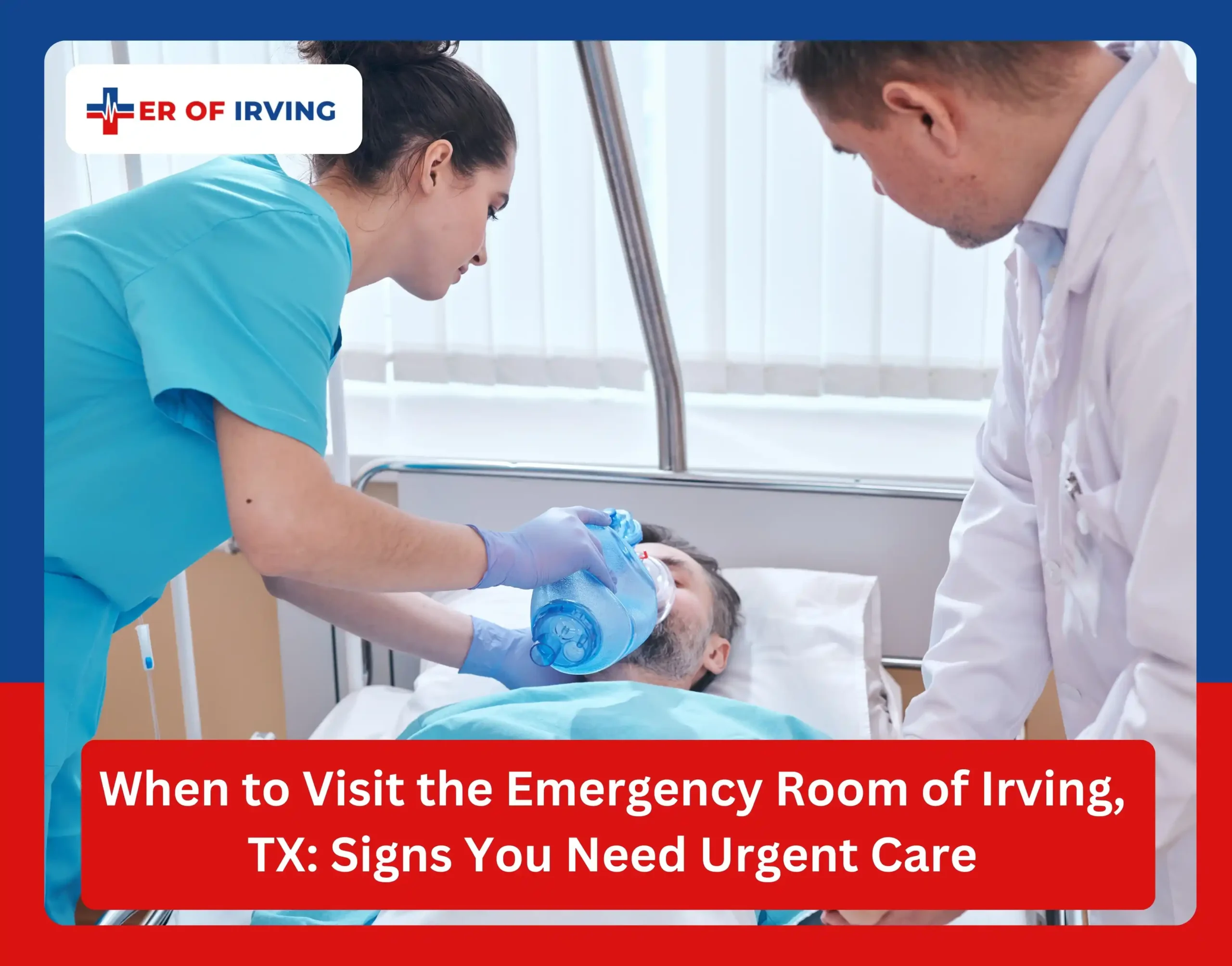Emergencies can happen anytime, and knowing when to seek immediate medical attention can save lives. While some conditions can be treated at an urgent care center, others require a visit to the emergency room in Irving, TX. This guide will help you recognize emergency symptoms, differentiate between ER vs. urgent care, and find the best hospital in Irving for severe injury treatment.
Understanding When to Visit the Emergency Room

The emergency room (ER) is designed to handle life-threatening conditions and severe injuries that require immediate medical intervention. If you or a loved one experiences any of the following symptoms, do not hesitate to seek emergency care:
1. Severe Chest Pain or Heart Attack Symptoms
Chest pain, especially if accompanied by shortness of breath, nausea, or sweating, could indicate a heart attack. Immediate medical attention is crucial to prevent serious complications.
2. Difficulty Breathing or Shortness of Breath
Respiratory distress can be life-threatening, especially for individuals with asthma, COPD, or severe allergic reactions. An ER visit is necessary to ensure proper oxygen levels and treatment.
3. Sudden Weakness, Numbness, or Slurred Speech
These symptoms may indicate a stroke. Seeking medical care within the first few hours increases the chances of recovery. Remember the acronym FAST:
- Face drooping
- Arm weakness
- Speech difficulty
- Time to call 911
4. Head Injuries or Severe Trauma
A significant blow to the head, especially if followed by dizziness, loss of consciousness, or vomiting, requires an immediate visit to the ER for assessment and possible imaging tests.
5. Uncontrollable Bleeding or Deep Wounds
If the bleeding does not stop after applying pressure for 10 minutes, you need professional medical care. Deep wounds may also require stitches to prevent infection.
6. Severe Abdominal Pain
Intense stomach pain, especially when accompanied by vomiting, fever, or an inability to pass stool, could indicate appendicitis, gallbladder issues, or other serious conditions. For abdominal pain treatment, visit the nearest ER.
7. Seizures or Loss of Consciousness
A seizure, especially in someone without a prior history, or unexplained fainting, requires urgent evaluation in an emergency room.
8. Severe Burns
Third-degree burns, or burns covering large areas of the body, need immediate treatment to prevent infection and minimize long-term damage.
9. Suspected Broken Bones or Dislocations
If a bone is protruding through the skin, appears deformed, or cannot bear weight, an ER visit is necessary for X-rays and appropriate treatment.
10. Severe Allergic Reactions (Anaphylaxis)
Swelling of the face, difficulty breathing, or a rapid drop in blood pressure after exposure to an allergen requires immediate medical attention.
ER vs. Urgent Care: When to Choose Each Option

Understanding the difference between ER and urgent care can save time and ensure you receive the appropriate level of treatment.
| Condition | Emergency Room | Urgent Care |
| Chest pain/heart attack symptoms | ✅ | ❌ |
| Severe head trauma | ✅ | ❌ |
| Stroke symptoms | ✅ | ❌ |
| High fever in infants | ✅ | ✅ |
| Minor fractures or sprains | ✅ | ✅ |
| Ear infections or mild flu | ✅ | ✅ |
| Small cuts requiring stitches | ✅ | ✅ |
| Uncontrolled bleeding | ✅ | ❌ |
If you are unsure where to go, it is always safer to choose the emergency room of Irving, TX, especially if symptoms seem life-threatening.
Finding the Best Hospital in Irving, TX
If you or a family member need emergency care, finding a reliable hospital in Irving, TX, is essential. Consider factors such as:
✅ Accreditation and Reputation: Choose hospitals with good patient reviews and board-certified doctors.
✅ Specialized Departments: Look for facilities offering cardiology, trauma care, neurology, and pediatrics.
✅ 24/7 Availability: Ensure that the emergency room operates around the clock with quick response times.
Some of the best hospitals in Irving, TX, known for severe injury treatment and emergency care, include:
- Baylor Scott & White Medical Center – Irving
- Medical City Las Colinas
- ER of Irving
These facilities are well-equipped to handle emergency symptoms, ensuring you receive prompt and effective medical care.
What to Do Before Reaching the Emergency Room

If you or a loved one needs to visit the ER in Irving, TX, follow these steps to ensure the best care:
- Call 911 for Life-Threatening Conditions: If symptoms indicate a heart attack, stroke, or severe trauma, paramedics can provide life-saving treatment en route to the hospital.
- Bring Essential Medical Information: Carry a list of current medications, allergies, and medical history for accurate treatment.
- Stay Calm and Follow Medical Instructions: If possible, inform the ER staff about your condition in advance for faster processing.
Conclusion
Knowing when to visit the emergency room of Irving, TX, can make all the difference in a medical crisis. Severe injury treatment, emergency symptoms, and life-threatening conditions should always be addressed at an ER rather than urgent care. Recognizing these warning signs and choosing the best hospital in Irving can ensure you or your loved ones receive the best possible medical attention.
FAQs:
What are the key emergency symptoms that require a visit to the ER in Irving, TX?
If you’re experiencing severe chest pain, difficulty breathing, sudden confusion, uncontrolled bleeding, or a head injury, you should visit an emergency room immediately. These are critical emergency symptoms that need urgent medical attention.
How do I know if I need the ER or urgent care for my symptoms?
The choice between an ER and urgent care depends on the severity of your condition. Emergency rooms handle life-threatening issues like heart attacks, strokes, or severe injuries, while urgent care centers are ideal for minor illnesses, sprains, and non-life-threatening conditions.
What types of severe injuries require emergency treatment?
Severe injury treatment at an ER is necessary for deep wounds, broken bones, severe burns, head trauma, or injuries causing heavy bleeding. Delaying care for these conditions can lead to complications, so visiting the ER in Irving, TX, is crucial.
Which is the best hospital in Irving, TX, for emergency care?
The best hospital in Irving, TX, for emergency care, should have 24/7 ER services, experienced medical staff, and specialized trauma care. Look for top-rated hospitals with advanced emergency facilities to ensure prompt and effective treatment.
Can I visit an ER in Irving, TX, without insurance?
Yes, emergency rooms in Irving, TX, provide treatment regardless of insurance status. However, it’s best to check hospital policies on billing and payment plans if you’re concerned about costs.








